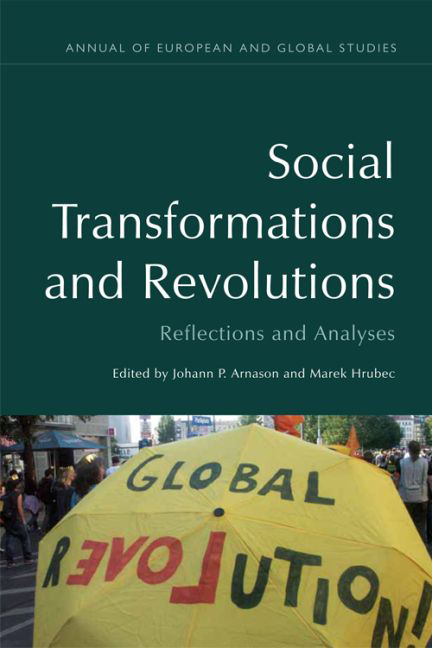Book contents
- Frontmatter
- Contents
- 1 Introduction
- 2 A Trialogue on Revolution and Transformation
- 3 Revolutions, Transformations, Civilisations: Prolegomena to a Paradigm Reorientation
- 4 The Transformation of Capitalism and the Limits of Democracy
- 5 From Civilisational Crisis to Revolutionary Transformation?
- 6 Environmental Crisis and Political Revolutions
- 7 Communists and Social Democrats in the Hungarian Soviet Republic
- 8 Can Political Participation Become Dangerous for Democracy? Participatory Experiences in Brazil and the Reactions Against Them
- 9 Hidden Revolutionary Processes in 1990s India?
- 10 Matching Reforms of Political and Economic Systems of China
- Notes on the Contributors
- Index
6 - Environmental Crisis and Political Revolutions
Published online by Cambridge University Press: 15 September 2017
- Frontmatter
- Contents
- 1 Introduction
- 2 A Trialogue on Revolution and Transformation
- 3 Revolutions, Transformations, Civilisations: Prolegomena to a Paradigm Reorientation
- 4 The Transformation of Capitalism and the Limits of Democracy
- 5 From Civilisational Crisis to Revolutionary Transformation?
- 6 Environmental Crisis and Political Revolutions
- 7 Communists and Social Democrats in the Hungarian Soviet Republic
- 8 Can Political Participation Become Dangerous for Democracy? Participatory Experiences in Brazil and the Reactions Against Them
- 9 Hidden Revolutionary Processes in 1990s India?
- 10 Matching Reforms of Political and Economic Systems of China
- Notes on the Contributors
- Index
Summary
THE CONFLICTS AND revolutions in North Africa and the Middle East during the last few years have multiple causes; among the main but not always most visible ones, we can surely list excessive use of resources, environmental limits to population growth and consumption, and the resultant long-term inability of these countries to supply their inhabitants with food and drinking water from domestic reserves. Egypt, the world's top wheat importer, is an obvious case in point.
According to Terazono and Saleh (2013: 2), the Egyptian government had to back down in 1977 when riots broke out following a rise in the prices of staple foodstuffs, and since then food subsidies have been a sensitive issue. When the food crisis of 2007–8 made wheat more expensive than ever, many families had to rely on subsidised bread, and army bakeries helped to maintain supply.
The situation worsened in 2010 when, due to the drought and extensive burning of cornfields, Russia banned the export of wheat in order to reserve its supply for its own inhabitants. Wheat prices – and consequently the price of staple food items – increased to such an extent that riots broke out not only in Egypt (Palazzo 2014) but also in other North African countries reliant on its import. These riots destabilised the whole region and in many areas grew into a real Hobbesian war of all against all. The subsequent regime change in Egypt has not improved the situation. The liberalisation of the political system worked in favour of fundamentalists whose leader became the first democratically elected president of Egypt. However, this provoked resistance from the secular opposition supported by the army and so in 2013 the military regime in the country was restored. We might talk, then, of one revolution in 2011 and another in 2013, although the latter could be considered as a counter- revolution (Beránek 2013). The production and sale of oil, which has been the source of foreign currency for the purchase of wheat, is decreasing; therefore, the riots continue. Since 2010, Egypt has spent most of its foreign reserves on importing wheat, which it has not been able to grow because of the lack of suitable farmland and water for irrigation.
- Type
- Chapter
- Information
- Social Transformations and RevolutionsReflections and Analyses, pp. 99 - 120Publisher: Edinburgh University PressPrint publication year: 2016



